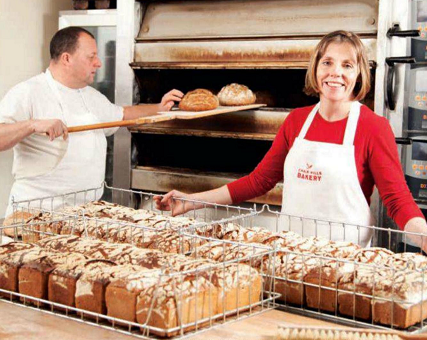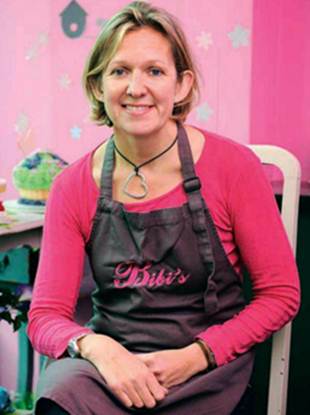Rosie Robinson, 48, was a researches
for a chartered surveyor, before opening the Chalk Hills Bakery with her
husband, Chris. They have two children and live in Surrey

“I hired
a baker to make my recipe ideas a reality”
The idea When Chris was made redundant in
2006, we decided that I wouldn’t return to work after maternity leave and the
time had come to seize the day and fulfil our dreams of travelling. So we sold
our house and spent eight months seeing the world. On returning to the UK, we
ran a gastropub for three years and made a name for ourselves locally for our
handmade bread. Artisan bakers were popping up in London and we realised there
was a real demand.
What
happened next We left the pub, rented a house and looked for one site big
enough to bake and sell bread – but everywhere was too expensive. So we
approached local farms, looking for a barn we could convert. The people at
Priory Farm knew our bread and loved the idea of us baking it for their shop.
We agreed an annual rent of £9,100 for the barn and paid £35,000 to install
mixers and ovens, and buy baking equipment, such as crates and trays. Next was
£15,000 to upgrade the electrics and plumbing, and cover the legal fees of
changing the site’s usage. We had savings from our house sale, but also
borrowed from family. I knew I couldn’t bake enough bread by myself, so I
advertised on well-respected baker Dan Lapard’s website to find a baker, and
went on a bread-making course at The School of Artisan Food in Nottinghamshire.
We also took on two part-time staff to make cakes. Without our own shop, we
focused on securing wholesale business with farm shops, gastropubs and village
shops. We paid £8,000 for a second-hand delivery van, and had our name and logo
printed on the side, which was £185 well spent because it has been brilliant
publicity. And we asked friends to create our website.
Where we
are now By the end of January 2011, we were making £10,000 a month,
by March, £20,000. So when a shop became available on Reigate’s high street, we
took the plunge, paid £30,000 for fittings and accessories, and, in June,
opened our first shop. We have a full-time shop manager, a second baker, a
driver and ten casual staff. We’ve expanded our core range to include flavoured
breads, such as fig and walnut, and prune and rye, which won a Gold Star at the
Great Taste Awards. We’re turning over around £38,000 a month, have won a local
business start-up competition and are looking for a second shop. We cover our
costs, but all profit goes back into the business and we expect to pay
ourselves a salary next year.
Glitches We aim to sell out to reduce wastage.
Customer often complain we sell out too quickly, but
it’s a fine balance between that and baking too much.
My tips Don’t rely
on one type of business – having the shop ensures we have regular income when
wholesale orders are low, and vice versa.
Business in
figures
Launched
November 2010
Start-up
costs £50,000
Current
turnover £400,000
chalkhillsbakery.com
Fiona Pratt, 42, worked for Scottish Widows before
opening her luxury cake shop, Bibi’s Bakery. She lives in Fife with her husband
and four children, aged nine to three.

“I used
to sell 200 cakes a day – now it’s 1,500!”
The idea I left Scottish Widowa in 2008,
after my third child was born. I wanted flexible hours and loved baking for
family and friends, so decided to open a small café and gift shop in St
Andrews, which cost £18,000 of savings. After two years, I realised my
cakes were the big draw and also a more constant income. I decided to sell the
café and set up Bibi’s Bakery, focusing on indulgent cupcakes to take away – a
new concept in the town.
What
happened next A shop was available for rent on the busy high street and,
because it had been empty for months, I was able to negotiate a good price. I
used savings and money from the café to create a boutique interior, with
granite worktops and a commercial kitchen, at a cost of £25,000. I used local
tradesmen instead of a shopfitter to keep costs down, and employed one member
of staff to help me bake each morning. Fortunately, my mum was happy to provide
free childcare. A friend made a simple website for £200, and I created Twetter
and Facebook accounts. A local company designed my logo and I found a supplier
of simple takeaway boxes online. We opened in March 2010, with 200 cupcakes,
costing £1.75 each. In an hour and a half, we’d sold out and put a notice in
the window to say we were baking more. An hour later, there was a queue outside
the door. In October 2010, I decided to open a second shop in Edinburgh, which
is bigger but similar in demographic. I used money from the business and sold a
personal investment to cover the £34,000 set-up costs, and hired a manager and
baker. Through social networking sites, I had so many requests to open a third
shop in Aberdeen that, in November 2011, I was confident enough to do so.
Where we are now I sell on average 1,500 cakes a day in each branch and have 19 members
of staff. I’ve
expanded the range to include traybakes, macaroons and brownies, which I also
sell online and deliver nationwide – I tried sending cupcakes to myself through
the post, but they arrived looking far from appetizing! I have full-time bakers
in each shop, who also run cake-making courses, and three managers. Delegating
has given me time to focus on developing new flavours, and I’m also planning a
franchise model.
Glitches When I kitted out my first
commercial kitchen, I had no experience of legal requirements. Food and hygiene
representatives from the council were helpful but, on their advice, I had a
£6,000 oven installed and paid £5,500 to upgrade the energy supply to
compensate. I later realised I could have got away with a £2,500 model that was
more efficient.
My tips I hand unsold cales out to local
businesses for free – it nearly always generates new business w&h
Business in
figures
Launched
March 2010
Start-up
costs £45,000
Current
turnover £600,000
bibisbakery.co.uk